 export@ezsteelpipe.com
export@ezsteelpipe.com +86 731 8870 6116
+86 731 8870 6116

In an oil and gas refinery plant, steel and metal pipelines are critical components that transport crude oil, refined products, gases, and other process fluids between different units. These pipelines must withstand high pressures, corrosive environments, and extreme temperatures. Below is an overview of their types, materials, and applications:
Refineries use various pipelines for different purposes:
Crude Oil Pipelines – Transport unprocessed crude from storage to distillation units.
Process Pipelines – Carry intermediate products between refining units (e.g., from distillation to cracking units).
Utility Pipelines – Transport steam, cooling water, nitrogen, and other utilities.
Product Pipelines – Distribute refined products (gasoline, diesel, jet fuel) to storage or loading facilities.
Flare and Vent Lines – Handle excess gases and emergency releases.
Pipelines in refineries are typically made from carbon steel, stainless steel, and alloy steels, selected based on fluid properties, temperature, and pressure:
A. Carbon Steel Pipelines
- Grade A53, A106, API 5L (common for crude oil, water, and steam).
- Advantages: Cost-effective, strong, and weldable.
- Limitations: Susceptible to corrosion (requires coatings or inhibitors).
B. Stainless Steel Pipelines
- Grades 304, 316, 321, 347 (used for corrosive fluids, high-temperature processes).
- Applications: Sulfuric acid service, hydrocracking, catalytic reforming.
- Advantages: Excellent corrosion resistance, handles high temps.
C. Alloy Steel Pipelines
- Grades P5, P9, P11, P91 (for high-temperature & high-pressure services).
- Applications: Hydroprocessing units, furnace tubes, steam lines.
D. Duplex & Super Duplex Stainless Steel
- Grades 2205, 2507 (high chloride environments, offshore applications).
- Advantages: High strength, corrosion-resistant.
E. Nickel Alloys (Inconel, Monel, Hastelloy)
- Used for highly corrosive fluids (e.g., hydrogen sulfide, acidic crudes).
- Pressure & Temperature Ratings: Pipelines must meet ASME B31.3 (Process Piping Code).
- Corrosion Protection: Internal linings, cathodic protection, or chemical inhibitors.
- Insulation: For high-temperature lines (e.g., steam pipes) or cryogenic services (LNG).
- Welding & Flange Connections: Critical for leak prevention in hazardous areas.
- Inspection & Maintenance: Regular NDT (ultrasonic, radiography) to detect cracks or thinning.
- Corrosion (sour service, CO₂, chlorides).
- Erosion (sand, particulates in crude).
- Thermal Expansion (high-temperature lines require expansion loops).
- Fatigue & Stress Cracking (cyclic operations).
Steel and metal pipelines in refineries are engineered for durability, safety, and efficiency, with material selection playing a crucial role in preventing failures. Proper maintenance, inspection, and corrosion control ensure long-term reliability in harsh refinery environments.
Would you like details on specific piping standards or pipeline material optimization?
 Related Products
Related Products